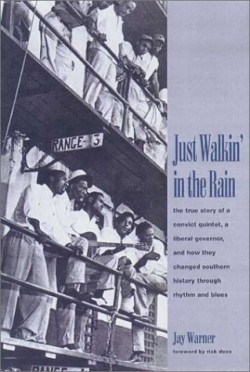Just Walkin' in the Rain
Few people who were dancing and romancing in 1956 to Johnnie Ray’s new hit, “Just Walkin’ in the Rain,” realized that the song had been co-written and first recorded three years earlier by a black man still serving a life sentence for rape in the Tennessee State Prison. That man was Johnny Bragg. Sentenced in 1943 at the age of sixteen to six ninety-nine-year terms, Bragg gradually turned to music to shield himself against boredom and brutality. By the late ’40s, he had become the driving force behind a group of singing inmates—modeled largely on the Ink Spots—that he dubbed the “Prisonaires.”
Because the prison was located in the music center of Nashville, Bragg and his fellow residents came into contact with such visiting performers as Roy Acuff, Ernest Tubb, Little Jimmy Dickens, Muddy Waters, Louis Jordan, and (according to Bragg’s own undocumented recollection) Hank Williams.
The greatest influence on Bragg’s life, as it turned out, was not another musician but a politician. Frank Clement was elected governor of Tennessee in 1952 on a progressive platform. Firm in his belief that people could change for the better, Clement took up the politically unappetizing cause of prison reform. Through the man he installed as warden of the prison, Clement became acquainted with Bragg and his singing group. Before long the Prisonaires were leaving prison, under the lightest security, to sing at radio stations, churches, clubs, civic events and, routinely, the governor’s mansion in Nashville. So strong was Clement’s trust in the group that he even approved its travelling to Memphis to record for Sun Records. They did not set the charts afire with their records, but they did score a series of regional hits, including “Just Walkin’ in the Rain.”
Ultimately, the governor would endorse—one by one—the parole of all the Prisonaires. Because of his rape conviction, Bragg was the last to receive the royal favor. Now in his late 70s, Bragg is the group’s only surviving member. During their glory days, the Prisonaires performed for and mingled with the likes of President Harry Truman, Senator Lyndon Johnson, pop singer Dinah Shore and rising star Elvis Presley. Bragg’s accounts of his encounters with Presley, some of which, as Warner notes, may be apocryphal, are always fascinating.
Warner, a veteran music publisher and author of The Billboard Book of American Singing Groups, writes with charm, authority, and precision. Since neither Bragg nor Clement is much heard of these days (Clement died in an automobile accident in 1969), Warner has provided a valuable service in resurrecting their truly trail-blazing public lives.
Reviewed by
Edward Morris
Disclosure: This article is not an endorsement, but a review. The publisher of this book provided free copies of the book to have their book reviewed by a professional reviewer. No fee was paid by the publisher for this review. Foreword Reviews only recommends books that we love. Foreword Magazine, Inc. is disclosing this in accordance with the Federal Trade Commission’s 16 CFR, Part 255.

